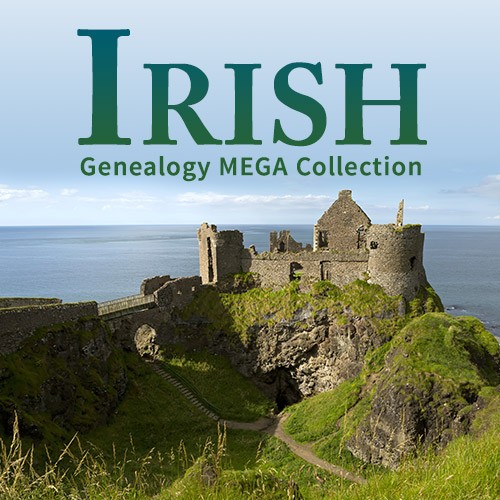by Lisa Cooke | Jan 14, 2017 | 01 What's New, Newspaper
Newspapers can fill in the gaps to the long-lost stories of your ancestors. These tips will help you narrow your search in digitized WWII newspapers for experiences directly relating to the war and to the lives of your ancestors.

In this previous post, I provided step-by-step tips for locating WWII-era newspapers. Those tips helped you locate the actual newspapers. In this post, I’ve got 7 tips for to help you focus on narrowing down a large list of results in search of war-related family stories.
Tip 1: Try Various Name Combinations in WWII Newpapers
If you are keyword searching in digitized newspapers, remember to try different name combinations. A man may be identified by just his first initial and last name. During the 1940s, a woman might be referred to as “Mrs. Ted Johnson” instead of Barbara Johnson.
Tip 2: Search for Addresses
You might find a family identified as “the Johnson’s of 132 Cherry Lane,” so try using street addresses in your searches, remembering that “Lane” might be spelled out or abbreviated. You may also find the family listed by their town or township. An example of this might be “the Johnson’s of Brown township,” or “the Johnson’s of Conover.”
Tip 3: Expand Your Search to Events and Organizations
Use any search terms you already know about for your family in World War II: a military unit, a battle or local service organization, or a war effort project that the folks back home may have helped out with. Do family stories mention rationing, air raid drills, bomb shelters, blackout rules, or one of the women getting a job at a certain factory? All these make excellent search terms.
Tip 4: Take Time to Browse
Browsing the pages will give you a sense of how the war affected everyday life at home. You may find recipes that make the most of ration allowances and reminders about blackout rules and curfews. You may even find tips on how to conserve gasoline or how to be fashionable without silk stockings!
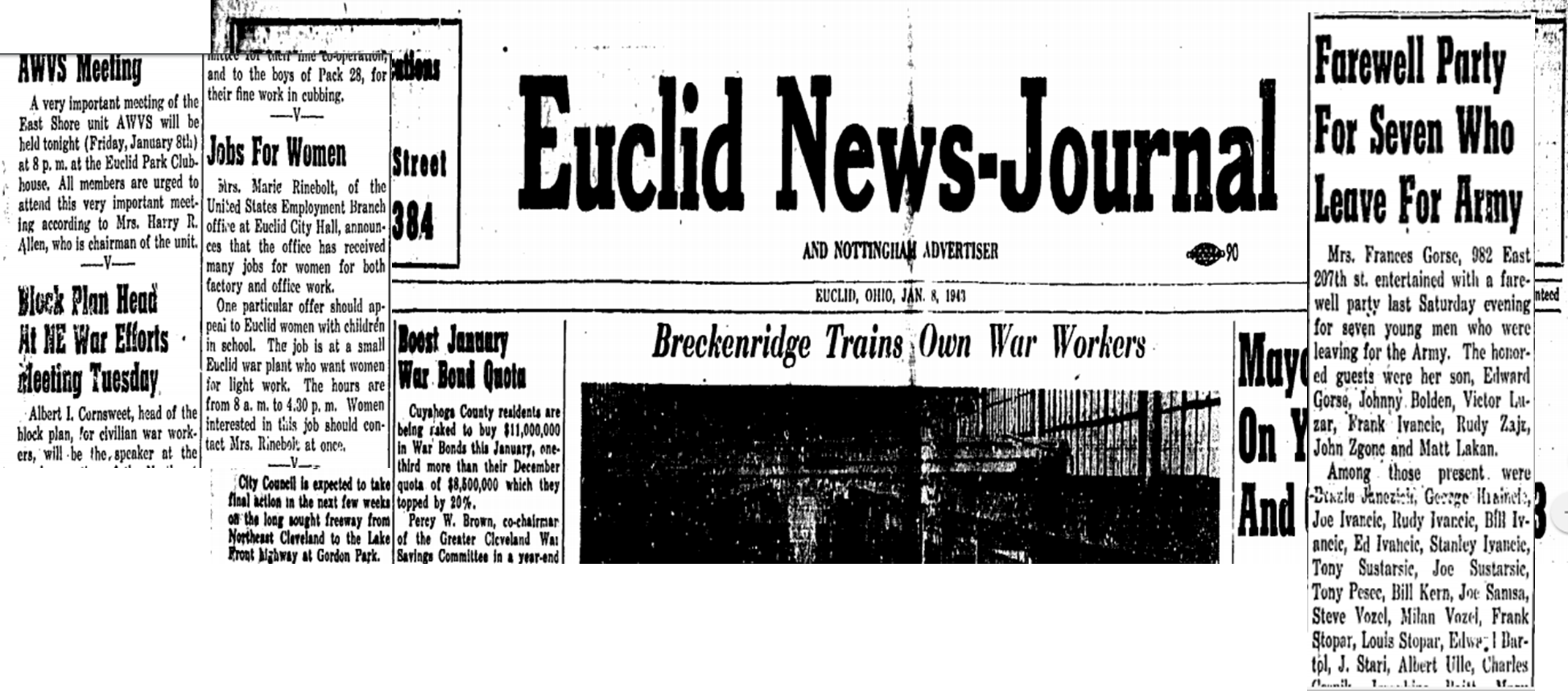
Almost every news item on the front page of this Jan 8, 1943 issue of the Euclid News Journal (OH) has to do with the war. It’s easy to see how the war affected everyday life of this small Ohio city on the shores of Lake Erie. Issues of this paper are searchable at the Euclid Public Library website (click image to view more issues.)
Tip 5: Be Aware of Newspaper Stoppages
If your family lived in an area that came under attack or was occupied, the local newspapers may have stopped printing. In that case, search other papers to see if they reported what was going on in your ancestor’s town.
Tip 6: Keep an Eye on the Homefront
For relatives who served in the military, watch for updates in local papers about how they were faring on the fronts during the war. Watch for casualty lists of the wounded, dead, and missing. Here’s something cool: newspapers also printed maps showing the progress of the war on the various fronts.
Tip 7: History Provides Hints
If you’re looking for reports about soldiers’ bodies returning home and funeral services, it will help to know that according to an article in The Wall Street Journal, the War Department didn’t start bringing back remains until the fall of 1947 because of the huge logistical challenges involved. Over 93,000 American soldiers who died in World War II are buried overseas in one of the American Battle Monuments Commission cemeteries.
Making the Most of Newspapers for Family History
 Find more tips like these in my book, How to Find Your Family History in Newspapers. You’ll find step-by-step instructions for my foolproof research process, along with everything you need for success: worksheets and checklists, tons of free online resources (and websites worth paying a few bucks for), a massive amount of location-specific websites (U.S. and international)–and a case study that puts it all to the test!
Find more tips like these in my book, How to Find Your Family History in Newspapers. You’ll find step-by-step instructions for my foolproof research process, along with everything you need for success: worksheets and checklists, tons of free online resources (and websites worth paying a few bucks for), a massive amount of location-specific websites (U.S. and international)–and a case study that puts it all to the test!
by Lisa Cooke | Oct 16, 2016 | 01 What's New
We know you want to keep up-to-date with where Lisa will be giving her lectures and presentations. This fall, we have three upcoming events. Here all the details:
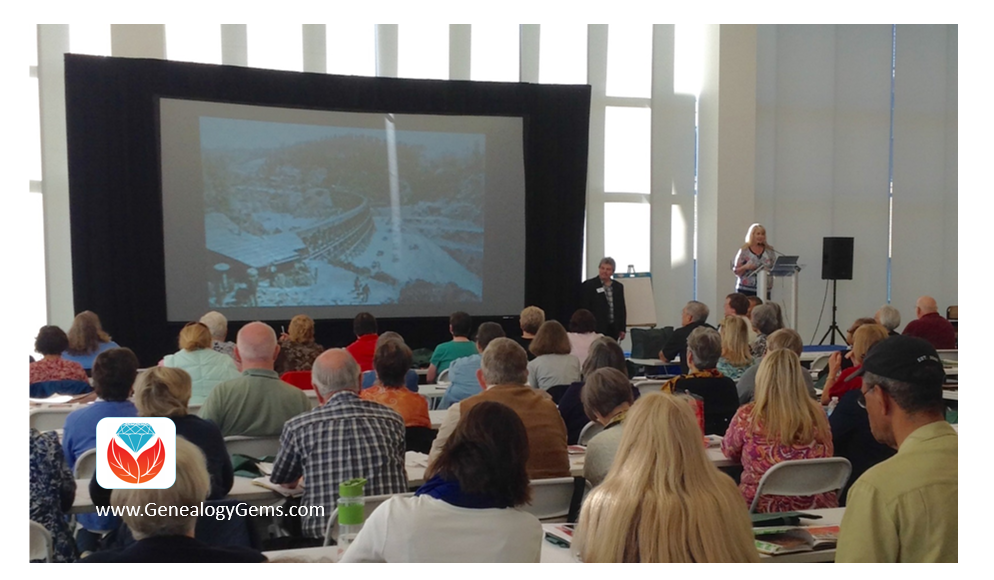
Lisa Louise Cooke speaking at the Columbus Ohio Metropolitan Library
Upcoming Events: Kansas
The Johnson County Genealogical Society will be holding an all day seminar on the 22nd of October. Lisa’s topics include:
- How to Reopen and Work a Genealogical Cold Case
- The Great Google Earth Game Show
- Tap Into Your Inner Private Eye: Nine Strategies for Finding Living Relatives
- Ways to Enhance Your Genealogy Research with Old Maps
What: Johnson County Genealogical Society 2016 Annual Seminar
When: Saturday, Oct. 22, 2016
Where: The Ritz Charles Event Center, 9000 West 137th Street, Overland Park, KS 66221
The event will take place at the Ritz Charles Event Center, 9000 West 137th St., Overland Park, Kansas. Registration is now open. To register online, click here.
Upcoming Event: Texas
Next on the list is the four day conference hosted by the Texas State Genealogical Society. This conference will take place in Dallas on October 27th through the 30th, and includes 35 speakers and an exhibit hall. Lisa will be giving two lectures:
- Beginning Evernote for Genealogists
- Using Google Earth for Genealogy
What: Texas State Genealogical Society Conference
When: Oct. 27 – 30, 2016
Where: Crowne Plaza Dallas Downtown
Online registration and payment is available through October 21st, but after that date you will need to register and pay in-person at the event, if space is still available.
Upcoming Events: Florida
Lisa’s final in-person speaking engagement for 2016 will be presenting as the Keynote Speaker for the 20th Annual Central Florida Family History Conference.
What: 20th Annual Central Florida Family History Conference
When: Saturday, November 12, 2016
Where: Olympia High School at 4301 S. Apopka Vineland Rd., Orlando, Florida.
You can register for the all-day conference online here. If you have a young person who is interested in genealogy, you’ll want to be aware that all students under the age of 18 are admitted free! Learn more details by visiting the Central Florida Family History Conference homepage.
Can’t Make it to an Upcoming Event?
 A Premium Membership to Genealogy Gems will give you access to over 30 of Lisa Louise Cooke’s video classes. From Evernote to DNA, Cloud computing and advanced research techniques, you will find this a great resource for your learning and inspiration. For more information on becoming a Premium Member, click here.
A Premium Membership to Genealogy Gems will give you access to over 30 of Lisa Louise Cooke’s video classes. From Evernote to DNA, Cloud computing and advanced research techniques, you will find this a great resource for your learning and inspiration. For more information on becoming a Premium Member, click here.
by Lisa Cooke | Oct 28, 2016 | 01 What's New
This week, we set sail to the islands with new and updated genealogical records for Hawaiian and Irish genealogy. Passenger lists and denization records shine a light on ancestors who walked the shores of beautiful Hawaii and previously classified records are revealed in the Easter Rising collections for Ireland. Also this week, the Canadian Census for 1901, and records for Maine, Kentucky, and the country of Benin.
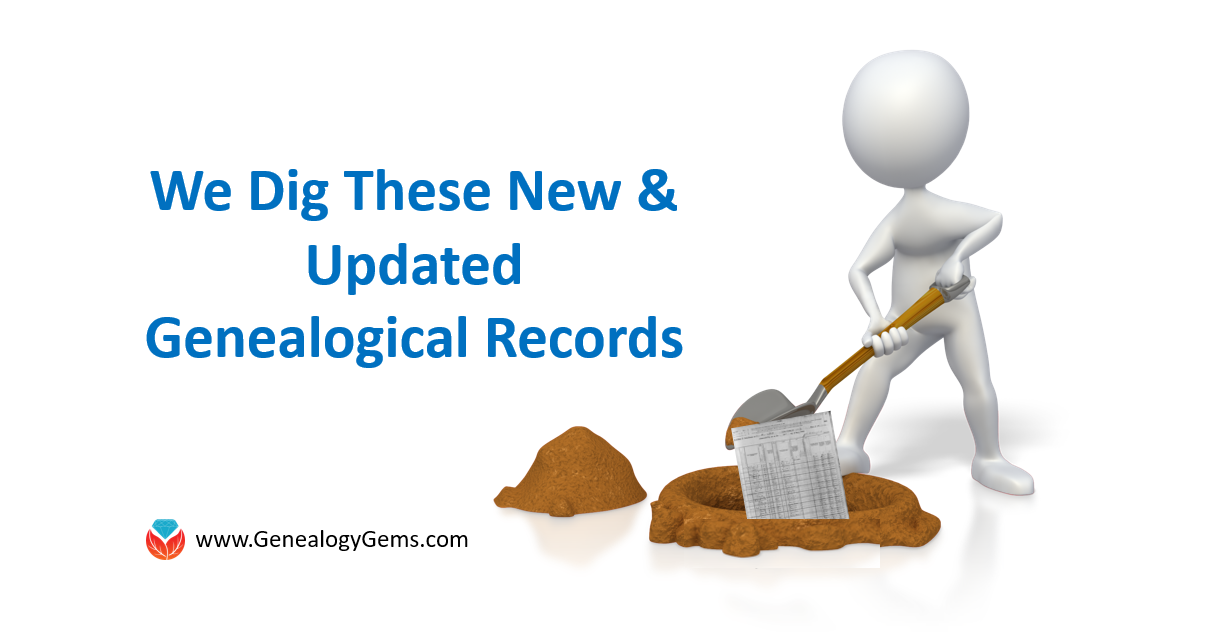
United States – Hawaii – Passenger Lists
This week at Ancestry, a new collection titled Hawaii, Passenger Lists, 1843-1898 is now available. It is searchable by name, birth, date of arrival, or date of departure. Specifically, this database includes passenger lists for ships arriving at and departing from ports in Hawaii between 1843 and 1898. This is both an index and a collection of digital images. Information may include a given and surname, age, gender, nationality or last place of residence, destination, ship name, and the date and place of departure or arrival. The names found in the index are linked to actual images of the manifests, digitized from originals at the Hawaii State Archives.
United States – Hawaii – Denization Records
Another new collection at Ancestry is the Hawaii, Denization Records, for 1846-1849, 1883-1898. Denization is the process used to grant a status similar to permanent residency and gave rights to denizens, such as the right to own land. These records are actually applications made by handwritten letters before 1895 and pre-printed application forms after that.
Information will vary, but may include:
- Name
- Age
- Occupation
- Place of origin
- Arrival date
- Record date
- Current residence
United States – Hawaii – Certificates of Identification
Lastly, Ancestry’s new collection Hawaii, Certificates of Identification for Chinese Arrivals, 1895-1898 may help find those connections back to mainland China.
This collection of certificates of identification for Chinese arrivals may include:
- Name
- Date of arrival
- Ship
- Permit number
- Photograph locator
Note: Photographs are not available in this collection. Photographs of arrivals were taken and kept in a Deposit Book. You can obtain copies of these photographs from the Hawaii State Archives using the locator information that is provided on each certificate.
Ireland – Easter Rising Collection
Findmypast has added over 48,000 additional records to their Easter Rising & Ireland Under Martial Law 1916-1921 collection. If you are not familiar with the Easter Rising, it took place on Easter Monday, April 24, 1916. A group of Irish nationalists announced the establishment of the Irish Republic and staged a rebellion against the British government in Ireland.

These were once classified records, but have now been digitized and can be browsed. These unique records document the struggles of life under martial law in Ireland and also contain details of both soldiers and civilians who participated or were affected by the Easter Rising of April 1916.
The collection contains the names of the hundreds of people who were detained and interned in prisons across Ireland, England, and Wales. Further, the internment files contain reports on individual detainees which record their charges, trial, and sentence as well as personal letters from prisoners or their relatives testifying to their innocence. Locating an ancestor in this collection would be a very special find.
Canada – Census
Findmypast has just added the Canada Census for 1901. It contains over 5.1 million records. The 1901 census was the first Canadian census to ask questions about religion, birthplace, citizenship, and immigration.
Each record includes a transcript and link to the digital image of the original census form. These census records will also list the name, date of birth, place of birth, marital status, relationship to head of household, race or tribe, immigration year, and naturalization year of each household member.
United States – Maine – Military
FamilySearch has added two new collections this week and one of them is Maine, World War I Draft Registration Index, 1917-1919. I don’t know if we have mentioned lately, but FamilySearch.org is free for everyone. This new collection for Maine is just one of hundreds available for genealogy records.
Records found in this collection generally conta in the following information:
in the following information:
- Name
- Place and date of birth
- Marital Status
- Residence
- Nationality and race
- Occupation
- Relatives’ names
United States – Kentucky – Marriages
This past summer, the Special Collections Research Center at University of Kentucky Libraries and the Fayette County Clerk’s Office developed a pilot project that will ultimately provide online access to Colored Marriage Indexes between the years of 1866-1882 and 1958-1968. The purpose of the project is to provide researchers with greater online access to these documents pertaining to African Americans in Kentucky.
The four volumes of the Colored Marriage Indexes are used to locate early marriage bonds of African Americans in Lexington, Kentucky. These indexes contain the name of each bride and groom and the page number of the marriage bond held at the Fayette County Clerk’s Office.
The digitized versions of the indexes are now freely available to the public on ExploreUK, UK’s digital library. The typed indexes have been run through optical character recognition (OCR) and are searchable.
Africa – Benin – Deaths
Death records may contain the following information:
by Lisa Cooke | Dec 9, 2016 | 01 What's New |
New and updated genealogical collections for the Royal Irish Constabulary are just the tip of the iceberg this week. Scroll down for more cool finds for New South Wales, Scotland, U.S. marriages, and an update to the Freedmen’s Bureau collections at FamilySearch.

Ireland – Royal Irish Constabulary Records
You can now search the Ireland, Royal Irish Constabulary Service Records 1816-1922 at Findmypast for over 486,000 records that uncover the details of your ancestor’s career with the R.I.C.
Each search result includes an image of the original document and a transcript. The nature of the information recorded will vary significantly depending on the subject and type of the original document. The following is a list of what types of records can be found in this collection:
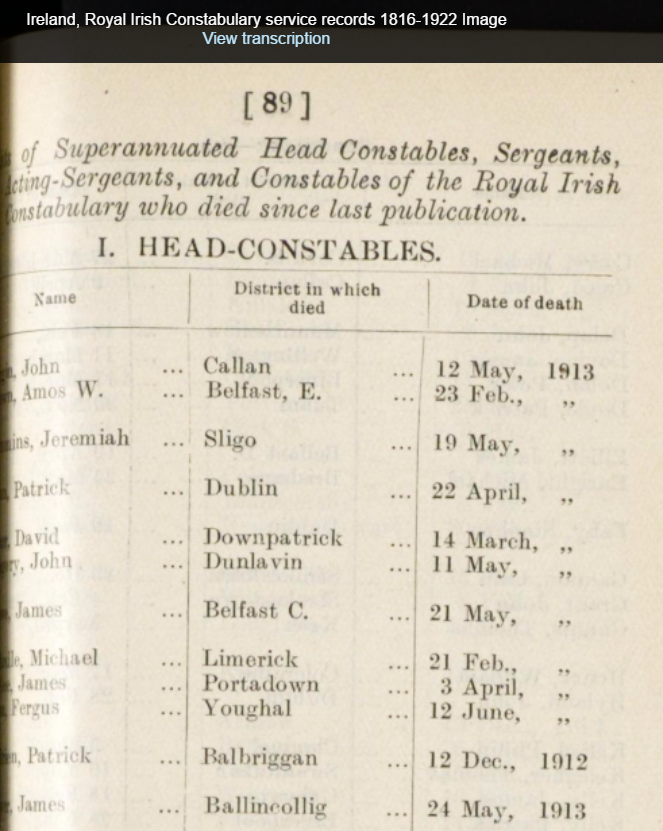
Auxiliary division general registers: These are nominal rolls that recorded member’s service number, rank, dispersed date, and company name. The registers also include division journals that recorded dates of appointment, promotions, and medical details.
Clerical staff: record of service and salaries: These lists of clerical staff include birth date, age at appointment, rank, department and salary.
Constabulary Force Funds: These correspondence registers are of members who paid into the fund with notes on whether they had been pensioned, died or received any rewards from the fund.
Constabulary lists: These are lists of chief constables created during the first year of the Royal Irish Constabulary.
Disbandment registers: These registers are of serving members who were with the force in 1922 when it disbanded after the creation of the Free Irish State. They also noted the number of years the constable served and their recommended pension.
General registers: Records of constables’ service history are contained in these general registers. The entries include the individual’s birth date, native county, religion, previous occupation, date of appointment, and promotions, as well as any rewards or punishments received and the date of pension or discharge.
Nominal returns, arranged by counties: Nominal returns are lists of all serving members of the Royal Irish Constabulary organised by county that recorded the individual’s number, rank, name, religion, date of appointment, marital status, and station location.
Officers’ registers: These registers are lists of Officers that include transfers and dates, favorable and unfavorable records, dates of promotions and details of previous military service.
Pensions and gratuities: Pension records reveal the constable’s rate of pay and the amount of pension calculated.
Recruits index: Lists of new recruits, their dates of appointment and arrival, and their company can be found in the recruits index.
Also at Findmypast, Ireland, Royal Irish Constabulary History & Directories has had a significant addition of over 43,000 records. You will be able to explore a variety of publications between the years of 1840 and 1921. These records will provide insight into the administration and daily operations of the police force.
Each record includes a PDF image of the original publication. The collection includes training manuals, codes of conduct, salary scales, circulars and staff lists that cover promotions, deployments, and rules & regulations.
Ireland – Valuation Books
At FamilySearch, the Ireland, Valuation Office Books, 1831-1856 are now available to search. These records are the original notebooks that were used when the property valuations were conducted between the years of 1831-1856. They are arranged by county, then alphabetically by parish or townland.
Land valuation records may contain the following information:
- Land occupier’s name
- Location, description, and monetary valuation of each land plot surveyed
New South Wales – Passenger Lists
The New South Wales Passenger Lists is a collection at Findmypast that contains over 8.5 million records. The collection includes records of both assisted and unassisted passengers. The assisted passenger lists cover 1828 to 1896 and the unassisted passenger lists span the years 1826 to 1900. Assisted passengers refers to those who received monetary assistance from another party or agency/government for their passage.
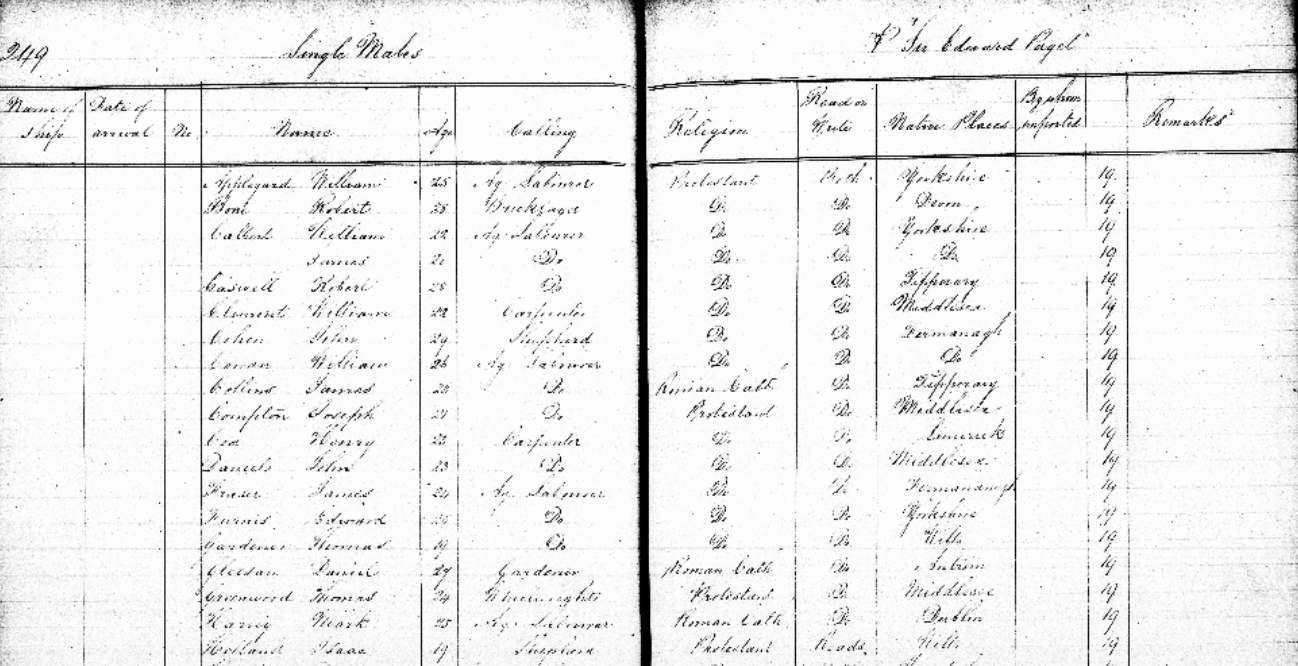
Each result will provide a transcript and image of the original record. The information included on the transcript will vary depending on whether your ancestor was an assisted or unassisted passenger, although most will include your ancestors name, passage type, birth year, nationality, departure port, arrival port and the dates of their travels.
Scotland – Parish Records
The Scotland Non-Old Parish Registers Vital Records 1647-1875 found at Findmypast is a collection of registers created by churches outside of the established church. It contains over 12,000 transcripts of births, marriages, and deaths.
Non-old parish registers are different from the Church of Scotland’s old parish records.
Though these are only transcripts and do not include a digital image of the original, you may find the following information on the records included in this collection:
With each result you will be provided with a transcript of the details found in the original source material. The detail in each transcript can vary depending on the event type and the amount of information that was recorded at the time of the event. Here are some of the facts you may find in the records:
- Name
- Birth year, date, and place
- Event year
- Event type – birth, marriage, or death
- Register name
- Parish and county
United States – Freedmen’s Bureau Records
FamilySearch has updated their magnificent collection of United States Freedmen’s Bureau, Records of Freedmen, 1865-1872. Records found in this collection include census returns, registers, and lists of freedmen. They also include letters and endorsements, account books, applications for rations, and much more. Many of the records will hold valuable genealogical data.
For a complete list and coverage table of the full collection, click here.
United States – Marriages – Oregon and Utah
Ancestry.com has recently updated two marriage collections. The Oregon, County Marriages, 1851-1975 and the Weber and Piute Counties, Utah, County Marriages, 1887-1940 have some new records. Marriage records will often provide many helpful genealogical details. Depending on the year, you may find:
- Name of the groom and bride
- Date and place of the event
- Birth dates and places of bride and groom
- Names of parents of both bride and groom
- How many previous marriages and marital status
- Place of residence of bride and groom
United States – Washington – Newspapers
Washington State historic newspapers added to their digital collection of newspapers this week. With nearly 50,000 digitized pages from historical newspapers based in Centralia, Eatonville, Tacoma, and Spokane newest titles include the Centralia Daily Hub (1914-16), The Eatonville Dispatch (1916-61) and Den Danske Kronike (1916-17), a Danish-English publication based in Spokane.
The Centralia and Eatonville papers were added this month and Den Danske Kronike was added last summer, along with the Tacoma Evening Telegraph (1886-87).
You will be able to search this newspaper collection for free from the Washington State Library website.
by Lisa Cooke | Jun 10, 2016 | 01 What's New, Records & databases

Here’s this week’s roundup of new genealogy records online: California, England, Australia, and Italy.
UNITED STATES – CALIFORNIA. Ancestry.com has added a new index titled California, Chinese Arrival Case Files Index, 1884-1940. This index includes passenger and crew lists of ships and airplanes arriving in California. Information you may find in these records are: name of passenger, ship name, port of arrival and in some cases, age, gender, birth date, birth place, and port of departure.
UNITED STATES – MILITARY. United States WWII Prisoner of War records for 1942-1947 have just been added to TheGenealogist.com in time for the anniversary of D-Day. These records inlcude U.S. military and Allies who were prisoners of war and internees. Some prisoners of both Germany and Japan are found in this collection. Records include the prisoners name, status, rank, service number, POW camp, and more valuable data.
ENGLAND – DEVON – PRISON RECORDS. Plymouth Prison Records for 1832-1919 at Findmypast include male and female prisoner records and prison officer records for Plymouth Prison in Devon. Recorded information includes name, birth date, offense, sentencing, last residence, residence of relative, physical description, and much more valuable data.
AUSTRALIA – QUEENSLAND – DEATH RECORDS. Findmypast subscribers can now conveniently search Queensland, Australia Death Records for 1829-1964 on Findmypast. These indexed records include: name, registration year, death date, father’s first and last name, mother’s first name, and sometimes her maiden name. (Birth, marriage and death indexes for Queensland are online for free at the State Library of Queensland website. Their death index goes from 1829-1986.)
ITALY – ROMA – CIVIL REGISTRATION. The Italian Civil Registration between the years of 1863-1930 has been newly added to FamilySearch.org. It is not yet indexed, but able to be browsed. Don’t be intimidated by its more than 4 million digitized images! They have broken down the database to be easily browsed by location and year. Marriage banns and residency records are just a two of things covered in this database.
 Don’t miss our newest free Genealogy Gems Podcast #192 for more tips and strategies to help you in your genealogy journey. Pop on over and listen now – we’d love to have you!
Don’t miss our newest free Genealogy Gems Podcast #192 for more tips and strategies to help you in your genealogy journey. Pop on over and listen now – we’d love to have you!


 Find more tips like these in my book, How to Find Your Family History in Newspapers. You’ll find step-by-step instructions for my foolproof research process, along with everything you need for success: worksheets and checklists, tons of free online resources (and websites worth paying a few bucks for), a massive amount of location-specific websites (U.S. and international)–and a case study that puts it all to the test!
Find more tips like these in my book, How to Find Your Family History in Newspapers. You’ll find step-by-step instructions for my foolproof research process, along with everything you need for success: worksheets and checklists, tons of free online resources (and websites worth paying a few bucks for), a massive amount of location-specific websites (U.S. and international)–and a case study that puts it all to the test!




 in the following information:
in the following information: